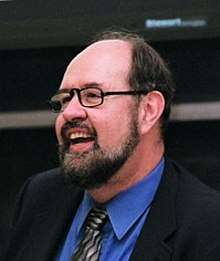William O. Beeman
William Orman Beeman is an American scholar whose specialty is the Middle East;[1] he is a professor of anthropology at the University of Minnesota, where he is Chair of the Department of Anthropology. For many years he was Professor of Anthropology; Theatre, Speech and Dance; and East Asian Studies at Brown University.
William Orman Beeman | |
|---|---|
 | |
| Born | Manhattan, Kansas, U.S. |
| Occupation | Professor of Anthropology at the University of Minnesota |
| Known for | Anthropology |
About
Born in Manhattan, Kansas. Beeman was trained as a linguistic anthropologist at Wesleyan University[2] and in 1976 he received his Ph.D from University of Chicago.[3]
Beeman's book, The "Great Satan" vs. the "Mad Mullahs": How the United States and Iran Demonize Each Other (2008), deals with the highly negative rhetoric and discourse between Iran and the United States over the three decades since the Iranian Revolution,[4] and its effects on national attitudes toward the Bush administration's policy towards Iran, as well as the possibility of military conflict between the two nations.
His latest publication is Iranian Performance Traditions which treats indigenous performance traditions of Iran. An important aspect of Beeman's work has been in the field of performance studies, particularly the study of non-Western theatrical traditions. In Iran, this includes the Iranian ritual passion drama, ta'ziyeh and the comic improvisatory theatre tradition, ru-howzi. He has also studied traditional performance in Japan, China and South Asia. His interest in the art world is also shown in his contribution to the co-authored volume Object, Image and Inquiry: The Art Historian at Work. He has authored more than 500 opinion pieces and media essays, and is the author of the blog Culture and International Affairs.
An admirer of the late anthropologist, Margaret Mead, Beeman has edited seven volumes of her post-World War II papers, having written scholarly introductions for several of them, including The Study of Culture at a Distance, and Studying Contemporary Western Society: Method and Theory.
He is also a professional opera singer, from 1996 until 1999 he sang operatic bass in Europe.[2][5]
See also
References
- Elliott, Justin (2011-03-21) A history of Libya and blowback, Salon.com
- "Notes from the Field with Dr. William O. Beeman". Religious Studies at UC Davis. 2018. Retrieved 2019-11-08.
He also holds courtesy appointments in Music and in Theatre Arts and Dance. He is a linguistic anthropologist and a professional opera singer.
- Guide to Departments of Anthropology. American Anthropological Association. 1989. p. 18. ISBN 0913167363.
- "Professor William Orman Beeman Discusses U.S.-Iran Relations on Radioactivity Friday". WMNF. Florida Public Radio. 2017-04-24. Retrieved 2019-11-08.
- "Speakers". Wesleyan International Relations Association. Retrieved 2019-11-08.